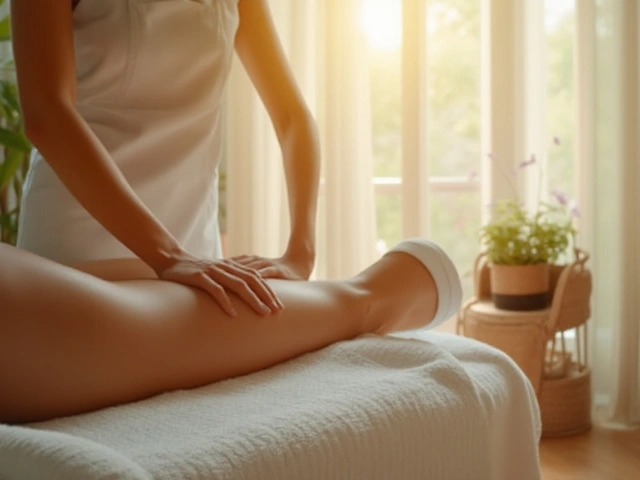Unveiling the Healing Benefits of Medical Massage for Mental Health

In today's fast-paced world, nurturing both body and mind is more crucial than ever. Amidst this hustle, medical massage stands out as a beacon of relief, attuned not just to physical wellness but mental tranquility. This age-old practice integrates therapeutic touch with an understanding of how the human body responds to stress and relaxation.
Surprisingly, while many seek out massage therapy primarily for alleviating physical discomforts, it's the mental health benefits that often emerge as an unexpected yet welcome bonus. Imagine walking away from a session with not only a relief from physical aches but also a lighter mood. As science delves deeper into the mind-body connection, we are witnessing how medical massage serves as a bridge between physical therapy and psychological wellness.
- The Science Behind Medical Massage
- Mental Health Benefits
- Techniques and Therapies
- Tips for Maximizing Benefits
The Science Behind Medical Massage
The practice of medical massage does not merely rest on ancient traditions, but is underpinned by a solid scientific foundation. This therapy engages the human body’s intricate physiological system, influencing the autonomic nervous system which controls bodily functions like heartbeat and digestion. By applying pressure, the massage stimulates the parasympathetic system, promoting a relaxation response that counters the common 'fight or flight' stress mode many people find themselves trapped in. This is why visits to a medical massage therapist often leave individuals feeling calmer, more centered, and even lighter in spirit.
During a session, diverse techniques are employed to target specific tissues and muscles. These techniques, ranging from gentle pressure to deeper manipulation, are designed to enhance blood circulation, which in turn aids in reducing inflammation and healing muscular tension. As the skin and underlying tissues are kneaded, tiny receptors called mechanoreceptors are activated. These receptors send messages to the brain that can trigger a release of neurotransmitters like serotonin and dopamine, known for leveling mood and managing anxiety. Medical massage thus fosters a physical environment within the body that is less conducive to stress and more inviting to emotional balance.
Interestingly, research has even shown correlations between regular massage sessions and a noticeable decrease in cortisol levels, the hormone often associated with stress. A study published by the American Psychological Association highlights this, suggesting regular massage can result in a significant 31% drop in cortisol, while boosting the body's natural feel-good hormones by as much as 28% for serotonin and 31% for dopamine. These findings illustrate that the benefits extend far beyond the immediate pleasure of a good rubdown, reaching into long-lasting mood regulation and mental health improvement.
A quote from the respected
Journal of Clinical Psychologysays, "Medical massage has the capacity to bring about not only physical restoration but to also enhance psychological well-being, establishing a harmony between body and mind that conventional treatments may overlook." This statement underscores the potential for therapeutic touch to become an integral part of holistic mental health care.
For those who wonder how often they should partake in this therapy to reap mental health benefits, recent findings offer a guideline. A bi-weekly schedule may serve to both manage existing stress and provide a buffer against new pressures. This frequency allows the body to maintain lower stress hormone levels while continually benefiting from increased mood-enhancing neurotransmitters. It's an accessible and pleasant way to help the body correct its biological rhythm, ensuring that mental clarity and peace are within reach.

Mental Health Benefits
Stress is a constant companion in modern life, and its effects are profound. Chronic stress can lead to anxiety, depression, and a host of other mental health issues. One might not initially consider medical massage as a remedy for mental ailments, yet, its impact can be powerful and enduring. The therapeutic potential of massage in enhancing mental wellbeing lies in its ability to promote relaxation and improve mood. When the body relaxes, the mind often follows. For those struggling with high stress levels, massage can be a gateway to mental clarity and peace.
The benefits don't stop at relaxation. Regular massage sessions are known to release increased amounts of endorphins, dopamine, and serotonin - the body's natural mood lifters. This release can directly lessen the symptoms of anxiety and depression, providing a haven for those faced with mental health challenges. Lowering levels of cortisol, the stress hormone, further fortifies these effects. Such biochemical changes turn massage therapy into a holistic approach to emotional rejuvenation and stress management.
Therapeutic touch as part of medical massage doesn't just work its magic on the brain's chemistry but also fosters a sense of connection and stability. In today's digital age, human connection is often diminished, yet its importance remains. Knowing that touch can communicate empathy and warmth, a well-timed massage can provide the sensation of being cared for, bolstering mental health in ways we are only just beginning to understand. This element of connection and care plays a crucial role in the psychological relief many experience from consistent massage sessions.
According to the American Massage Therapy Association, "Research supports the effectiveness of massage therapy for reducing stress, boosting mental health, and promoting sense of overall well-being."
For those living with anxiety, the rhythm and pressure of massage can be particularly calming, helping to redirect their minds from lingering worries. A deep tissue massage, for example, not only relaxes the muscles but also serves as a meditative practice, helping individuals stay grounded in the present moment. When this happens, the overwhelming thoughts can ebb, and clarity can take their place. Studies have shown marked improvements in patients with anxiety disorders when coupled with regular therapeutic massage sessions.
Engaging in stress relief methods such as massage can generate cumulative benefits over time, improving not just mental health, but also self-esteem and energy levels. When massage becomes part of one's self-care routine, it sets a precedent for treating one's mind and body with care and respect. This shift in perspective can inspire a healthier lifestyle overall.

Techniques and Therapies
Diving into the realm of medical massage reveals a treasure trove of techniques and therapies that cater to both physical and mental health. These approaches are nuanced and meticulously crafted to promote healing and relaxation. The key here is understanding how distinct methods can have varying impacts on the mental health benefits of individuals. For instance, Swedish massage is perhaps the most renowned technique, characterized by its gentle, gliding strokes designed to improve circulation and ease muscle tension. What's fascinating is how this particular massage stimulates a relaxed response in the nervous system, thereby inducing a deep state of calm and mitigating feelings of anxiety.
Deep tissue massage, on the other hand, ventures beyond the superficial layers of muscles, targeting deeper muscle groups and connective tissues. It's known for its ability to release chronic muscle tension, but what often goes unnoticed is how it aids in releasing pent-up emotions as well. People have reported profound emotional releases during or after a session, shedding light on the intricate connection between muscle tension and emotional burden. This is why deep tissue massage has been praised not just for its stress relief on a physical level, but also for its psychological impacts. The energy release and emotional catharsis can be quite therapeutic.
Another intriguing method is the use of trigger point therapy. These are localized spots in the body that, when massaged, can lead to a reduction in pain in seemingly unrelated areas. The mechanics of this therapy lie in the body’s interconnectedness, where tension in one region can manifest discomfort elsewhere. Addressing these trigger points is like undoing knots in a tangled rope—everything seems to fall into place once the knot is gone. This concept can be mirrored in the mind, creating an astonishing synergy between physical and emotional equilibrium.
Aromatherapy and Integrative Approaches
Aromatherapy is often integrated into massage sessions, enhancing the calming effect through the power of scent. The choice of essential oils like lavender or chamomile can significantly augment the mental health advantages of the massage. These scents are understood to activate parts of the brain associated with mood and emotions. As Dr. Jane Smiley once noted, "Aromatherapy combined with massage creates an experience where touch and scent transform self-care into a sublime healing journey." Additionally, hot stone therapy is another popular adjunct to traditional massage, involving the placement of warm basalt stones on specific body points to enhance muscle relaxation. The gentle heat combined with massage techniques enables a tranquil state, akin to a meditative experience, known to alleviate anxiety and encourage mental clarity.
The versatility of medical massage allows therapists to tailor each session to an individual's specific needs, emphasizing the importance of a personalized approach. A massage therapist might incorporate elements of stretching, pressure adjustments, and even incorporate breathing exercises to deepen the calming effect, which is essential for maximizing the therapeutic touch. As these techniques are applied consistently, individuals experiencing mental health challenges can find themselves not just managing symptoms, but discovering newfound resilience and emotional strength.

Tips for Maximizing Benefits
Engaging in medical massage therapy offers a wealth of benefits, especially for mental health. However, to truly unlock its full potential, there are a few strategies that can enhance your experience. The first step is to approach each session with openness. Allow yourself to be fully present during the massage and maintain an awareness of your breath and body. This conscious engagement can significantly deepen the relaxation response, making the massage more effective in reducing stress and tension.
"Massage therapy can be a powerful ally in your healthcare regimen." — Mayo Clinic
Consistency is another crucial factor to consider when aiming to maximize the benefits of massage therapy. Like any form of therapy, regular sessions can compound the positive effects on both the mind and body. It may be beneficial to schedule massages weekly or bi-weekly, rather than sporadically, to build on the relaxation and emotional balance achieved in each session. It’s akin to exercise, where routine activity tends to yield better results than occasional workouts.
Communicate with Your Therapist
Open communication with your massage therapist should never be underestimated. Before starting your therapy session, it’s important to discuss any specific mental or physical concerns. Experienced therapists can tailor their techniques based on your feedback, which can significantly amplify therapeutic outcomes. Whether it's the pressure level you prefer or the areas you want them to focus on, expressing your needs allows for a tailored experience that addresses your unique mental state.
Create a Relaxing Environment
Creating a serene post-massage environment is almost as crucial as the session itself for maximizing the therapy's benefits. Post-session relaxation supports the body and mind in transitioning out of the massage effectively. Consider planning quiet time, free from stressors or demanding activities, immediately after your appointment. Allow your mind to integrate the calming impacts of the session. You could even enhance your environment with soothing music or aromatherapy with scents like lavender known for its calming properties, to extend the feelings of peace and relaxation.
Taking advantage of the incredible impact of medical massage on mental health by following these suggestions can lead to a notable enhancement in your emotional well-being. Whether you're seeking refuge from anxiety or striving to maintain a state of tranquility amidst life's pressures, being proactive in your approach to massage therapy can make all the difference. After all, true wellness is not just achieved by healing physical ailments but nurturing the mind and spirit as well.





